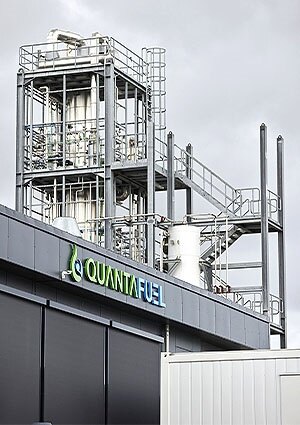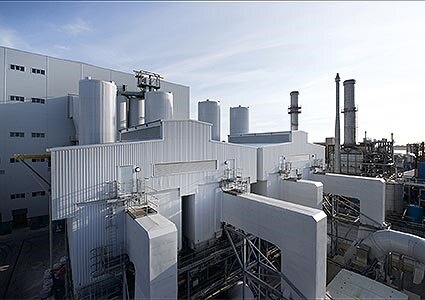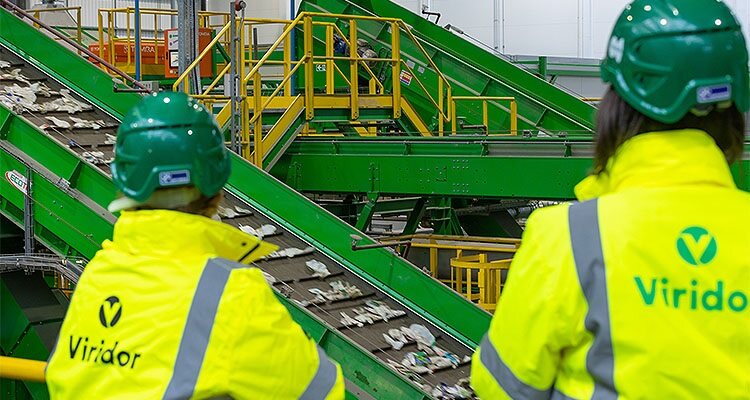Viridor’s vision is to be the UK’s leading innovator of resource recovery and recycling, transforming waste for a climate-positive future
Viridor is determined to play a leading role in transforming the waste sector so it can drive the creation of a net-zero, circular economy by 2050. After reducing, reusing and recycling as much as possible, its Energy Recovery Facilities (ERFs) provide the infrastructure to efficiently recover vital energy from residual waste, meaning landfill becomes the last resort.
The circular economy is often treated separately from the climate debate, and yet, the wasteful use of products generates significant greenhouse gas (GHG) emissions in extraction, manufacture and disposal.
 Viridor’s plastics reprocessing facilities are the most sophisticated of their kind in the UK, able to supply recycled plastics feedstock to manufacturers that can be directly substituted for virgin plastics in their processes, displacing the need to generate new products with higher embedded emissions. Removing those materials from the waste stream also avoids the GHG emissions associated with their disposal.
Viridor’s plastics reprocessing facilities are the most sophisticated of their kind in the UK, able to supply recycled plastics feedstock to manufacturers that can be directly substituted for virgin plastics in their processes, displacing the need to generate new products with higher embedded emissions. Removing those materials from the waste stream also avoids the GHG emissions associated with their disposal.
Circular economy strategy
Energy, Oil & Gas is joined by Tim Rotheray, Chief Sustainability Officer, who joined Viridor in 2019 to drive decarbonization and circular economy projects and to work with government and regulators to help ensure the policy environment enables the right investments. Tim shares how ERFs are vital in supporting the UK’s ambition to reduce waste in an efficient and effective manner, thereby helping to reduce the negative impact on climate change.
Since 2020, he has led Viridor’s ESG work, overseeing development and implementation of the company’s strategy with a focus on decarbonization and circular economy. In May 2020, Viridor published its sector-leading strategy setting out a pathway to achieve Net Zero in 2040 and become climate positive by 2045. This was followed in December 2021 by Viridor’s commitment to help create a circular economy for waste plastics in the UK.
Sustainable solutions
Viridor strives to develop and deliver innovative ways to reduce, reuse, recycle or recover energy from waste. As a leader in the sector, the organization takes pride in its growing and pivotal role in the UK’s drive towards sustainability, empowering communities with the provision of a more circular economy.
By combining the industry-defining expertise of its people, the multi-million-pound innovation of its technologies, and a collaborative approach with networks and partners, Viridor is well-placed to help bring to life the shared vision of a more sustainable future. The company’s name even derives from the Latin ‘to become green’.
Viridor endeavors to provide sustainable solutions to achieving a zero-waste society, through innovation, education, investment and with a commitment to the safety and wellbeing of its people.
“Over the past 12 months,” begins Tim, “there have been two significant highlights within the business. The first is the acquisition of Quantafuel, a chemical recycling business headquartered in Norway. This acquisition reflects Viridor’s ambition to lead innovation in the plastics recycling sector and deliver full circularity in all four major plastics by 2025. This is an important step for us in terms of our ESG strategy. Taking plastic packaging out of the waste stream is incredibly important for decarbonization. As a business, while we operate mechanical recycling facilities, and reprocess plastic back into raw material, we were experiencing a couple of shortfalls. One was that plastic film cannot readily be recycled in those facilities and the second is that there was no viable route to take three of the four major plastics back to food contact grade.
 “The chemical recycling process at Quantafuel, however, can do both of those things. Quantafuel’s plastics to liquids process converts waste plastics into a raw material, comparable to virgin fossil oil derived refined products. This material can be used in the chemicals industry to produce new plastics. It can reprocess polyolefins, including polypropylene and polyethylene, thereby achieving true circularity. We want to increase plastic recycling, not only to meet UK Government targets but because it’s something we need to do. Getting material out of the waste stream only works if there’s something to do with it. Chemical recycling is a novel technology and an exciting addition to our portfolio. Viridor assumed full ownership of Quantafuel, with the Oslo Stock Exchange delisting Quantafuel AS’ shares from Euronext Growth on 7th February 2024. This marks a significant moment as the company transitions into a new era under Viridor’s complete ownership,” he enthuses.
“The chemical recycling process at Quantafuel, however, can do both of those things. Quantafuel’s plastics to liquids process converts waste plastics into a raw material, comparable to virgin fossil oil derived refined products. This material can be used in the chemicals industry to produce new plastics. It can reprocess polyolefins, including polypropylene and polyethylene, thereby achieving true circularity. We want to increase plastic recycling, not only to meet UK Government targets but because it’s something we need to do. Getting material out of the waste stream only works if there’s something to do with it. Chemical recycling is a novel technology and an exciting addition to our portfolio. Viridor assumed full ownership of Quantafuel, with the Oslo Stock Exchange delisting Quantafuel AS’ shares from Euronext Growth on 7th February 2024. This marks a significant moment as the company transitions into a new era under Viridor’s complete ownership,” he enthuses.
Carbon capture
“The UK Government tends to act as something of a mirror for the rest of Europe in terms of policy direction, so we’re doing similar things in the UK to what’s happening in the EU to achieve those recycling rates. We’re tackling the low hanging fruit but there will be new policies surrounding the recycling of material, such as plastic film. Once film is routinely collected, there will be a big opportunity for us in terms of building chemical recycling facilities in the UK, as well as in other areas.
“The UK’s Climate Change Act is an incredibly useful piece of legislation and continues to have broad cross-party support and there is agreement that the UK needs to continue to act on climate change. Back in 2020, Viridor didn’t have a net-zero commitment. In 2021 however, we announced our commitment to achieving Net Zero by 2040. While some policy delays are a cause for concern, we are seeing more movement and cross-party agreement in terms of carbon capture and storage (CCS). In our sector, to treat chemicals and break them down safely they need to be heated to extreme temperatures, which creates carbon emissions. Hence, our engagement with government to include energy from waste in their CCS policy.”
Indeed, Viridor’s Carbon Capture Plant at Runcorn is the largest opportunity to accelerate deployment of CCS to decarbonize the waste sector. The UK Government announced in March 2023 that Runcorn Energy Recovery Facility’s CCS Project had been shortlisted for the final stage in the government’s industrial carbon capture (ICC) sequencing process. The proposed plant will be one of the first carbon capture projects on an energy from waste (EfW) facility in the world.
“At the end of March 2024,” Tim continues, “we announced that we have moved a step closer to making the UK’s first negative emissions project a reality, by agreeing a statement of principles with the UK Government’s Department for Energy Security and Net Zero (DESNZ). Developing CCS at Runcorn will kickstart a world leading carbon capture industry in the UK. The project alone will capture approximately 900,000 tons of CO₂ each year. Half of the captured CO₂ will be from biogenic sources, effectively removing 450,000 tons from the atmosphere annually and driving the development of a critical source of negative carbon emissions.
“After a highly competitive tender process, Technip Energies has been awarded the Front-End Engineering Design (FEED) contract and Fichtner has been chosen to provide Owner’s Engineer (OE) services. As part of the FEED study, Technip Energies will deliver a comprehensive design using their Canopy by T.EN™ solution powered by the Shell CANSOLV CO2 capture technology. The Canopy offering is part of Capture.Now™, which is Technip Energies’ strategic carbon capture, utilization and storage (CCUS) platform of technologies and solutions.
Commitment to climate
“This is a great next step in our ambitious plans to transform our business, building on our sector leading commitment to be climate positive by unlocking negative emissions from this essential waste management process. This project is a testament to what the government and private sector can achieve by working in partnership and marks the next stage in this exciting and ambitious journey towards being truly Net Zero, delivered for and working alongside the communities within which we operate.
“This will take our total committed investment to carbon capture in the UK to £20 million, which is a significant development expenditure. When we spoke last year, we were one of 20 waiting to get through, now we’ve been selected and are progressing with the full design of the facility. There are 50 facilities in the UK, and of those, we have ten. They are all broadly the same design, so there is the potential to replicate the model. Likewise, the potential for our sector to be this immense underpin of the UK’s delivery of carbon capture, which the Climate Change Committee says is 100 percent essential to achieving the UK’s net-zero goal, is a vast opportunity,” he explains.
“The next step is negative emissions and the concept of offsetting difficult-to-abate sectors, such as aviation, shipping or cement manufacturing, for example. Another potential is direct air capture (DAC), which is the use of chemical or physical processes to extract carbon dioxide directly from the ambient air. Right now, that technology may be prohibitively expensive, so we’re hoping to focus on kickstarting the negative emissions market. If we’re going to have any hope of maintaining a genuinely viable planet for humanity, we must significantly get that market moving.”
Looking to the future, Tim shares that the business will be focusing fully on the design of the carbon capture plant and its ambitions to roll out carbon capture to other facilities. “With a general election imminent, there’s also the possibility of a change of government and so, potentially, it will be important to ensure policy is accurate and that opportunities to prevent landfilling waste are fully maximized,” he elaborates. “It’s a challenging journey and we’re trying to do something that is relatively novel. That coupled with government negotiations means there are several complexities, but we have made it this far. I’m fortunate to work with an incredible team of people who are experts in their fields and we’re striving together to achieve something incredibly worthwhile,” he concludes.
